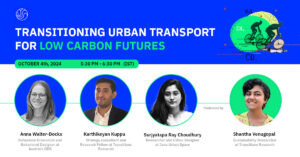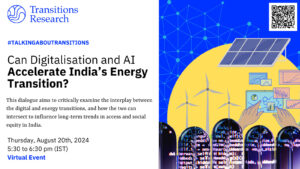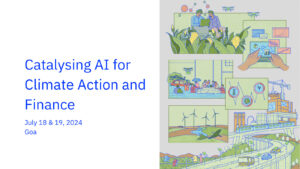Talking About Transitions feature critical conversations on systemic transitions at the interplay of technology, society and sustainability. Our Dialogue series provides a platform for thinking together about three major areas of change and challenge – urbanisation, climate change and digitalisation.
Our upcoming dialogue, “Can digitalisation and AI accelerate India’s energy transition?” will be held on 20 August, 2024, 5:30 pm to 6:30 pm IST.
Overview: The twin transitions of digital and energy transformations hold great promise for enhancing energy efficiency and sustainability. These transformations include the adoption of smart grids, the Internet of Things (IoT), and artificial intelligence (AI), which can drastically redefine energy generation, distribution, and consumption. For instance, while smart grids offer optimised energy distribution, IoT devices enable real-time monitoring, digital and AI innovations foster decentralised energy solutions, significantly improving energy access for millions.
India has made notable progress in recent years – with renewable energy capacity rising to over 143.64 GW as of 2024 and plans to expand to 500 GW by 2030. This growth is driven by substantial investments in solar and wind energy, with solar capacity increasing thirty fold in the past nine years. The Saubhagya scheme has connected over 28.6 million households to electricity since 2017, significantly reducing the number of households without power. Additionally, the National Smart Grid Mission (NSGM) and the installation of over 2 million smart meters have advanced grid efficiency and responsiveness. The Digital India program, launched in 2015, has leveraged technology to empower citizens, spur economic growth, and enhance governance.
Despite these advancements, more than 200 million people in India still lack a reliable power supply, especially in rural areas. Moreover, approximately 70% of the population has limited or no access to digital technologies, and over 60% of households remain digitally illiterate. Thus, the success of these transitions depends on addressing these critical social dimensions. Without inclusive policies, the benefits of these technological advancements may not reach marginalised groups, potentially worsening existing inequalities. This dialogue aims to critically examine the interplay between the digital and energy transitions, in order to address three broad questions:
1. In what ways can AI, and digital technologies accelerate clean energy transitions in India and where are the gaps?
2. What are the key challenges in harmonising digital advancements with energy sustainability goals in India and how can these be addressed to promote fair and inclusive development?
3. How might future advancements in digital and energy transitions in India influence long-term trends in access and social equity, and what strategies can be developed today to anticipate and mitigate disparities?
| Agenda: Can digitalisation and AI accelerate India’s energy transition? | |
| 5:30 – 5:40 pm | Introductions and context setting (TR team) |
| 5:40 – 6:15 pm | Moderated Q&A |
| 6:15 – 6:25 pm | Audience Q&A |
| 6:25 – 6:30 pm | Closing Remarks |




